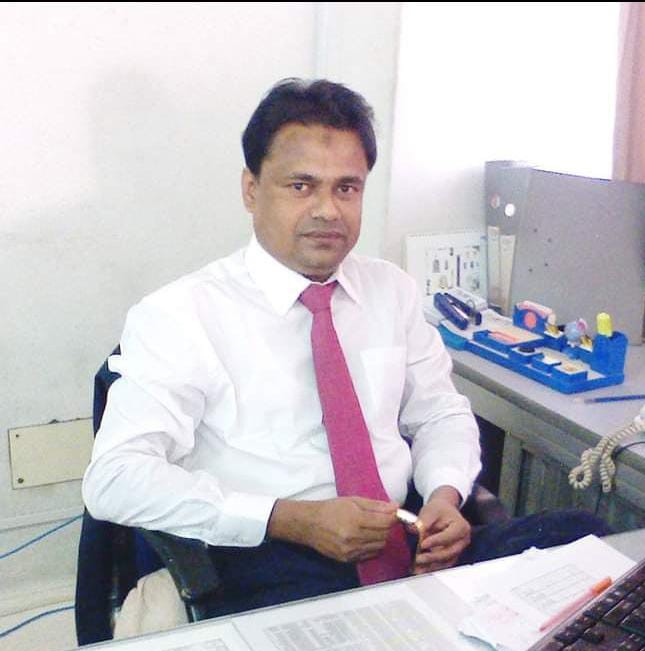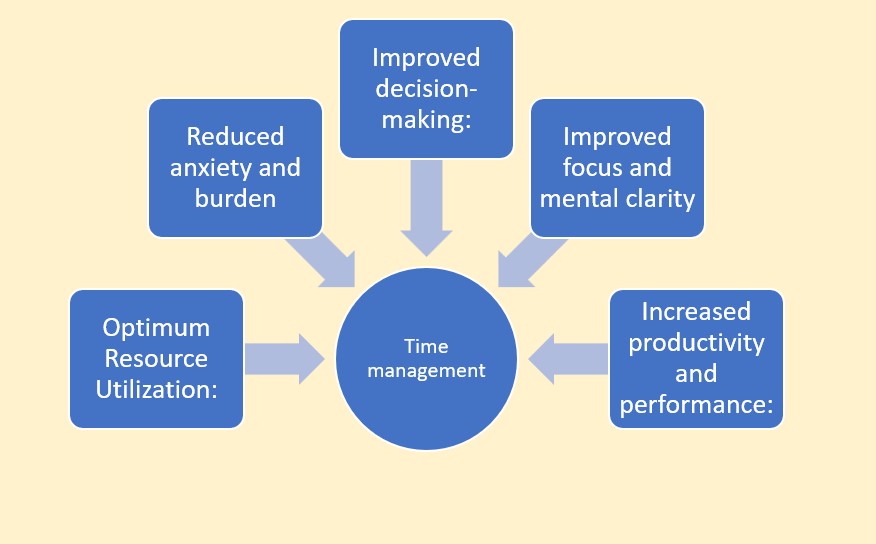Time Management.

Time management involves the strategic allocation of one’s time among various tasks. Efficient time management (TM) enables individuals to enhance productivity and accomplish tasks more expediently. It increases efficiency and productivity by controlling the time spent on various tasks. A key aspect of TM is goal setting. Guides you through your daily tasks and long-term projects. When you set SMART goals (Specific, Measurable, Attainable, Relevant, and Time-bound), you create a clear path to achieving them. TM is about making the most of the time available to you. It involves setting goals, prioritizing tasks, planning effectively, delegating, eliminating distractions, exercising self-discipline, and regularly reviewing your approach. With good TM skills, you can increase productivity, reduce stress, and achieve your goals more efficiently. Details are in this eBook ” Time Management by Abdul Aziz.”
Importance of time management.
Time management is critical because it increases productivity, reduces stress, improves decision-making, and improves work quality. Global resource sources are decreasing while the demand for products is increasing. Without increasing production capacity, it will be difficult to survive. By effectively managing your time, you will be able to achieve greater productivity within a shorter duration. resulting in greater productivity and efficiency. It also reduces stress and organizes tasks to set realistic deadlines.
Good TM improves your decision-making ability. With a well-structured plan, you can make informed decisions about how to use your time, ensuring that you allocate it to activities that yield the highest returns. This strategic use of time helps you achieve your personal and professional goals more efficiently. Time management also increases the quality of your work. You can achieve more with less effort, leading to a more fulfilling and successful life.
Critical points of time management.
Time management revolves around several fundamental principles that help increase productivity and efficiency.
Prioritize: Focus on the most critical and urgent tasks, ensuring time is spent on the most essential activities.
Goal Setting: Set clear, achievable goals to provide direction and purpose, making planning and allocating time easier.
Planning: Create detailed schedules or to-do lists to organize tasks and deadlines using tools like calendars and planners.
Eliminating distractions: Identify and reduce distractions to maintain concentration and productivity, such as turning off notifications and setting specific times to check email.
Delegation: Delegate tasks to others whenever possible to free up your time for higher-priority activities that require your expertise.
Regular Review: Evaluate and adjust your TM strategies to improve efficiency and effectiveness.
These principles help you make the most of your time, achieving more with less effort.
Mastering Time Management Skills.
Effective time management is essential for enhancing productivity and reaching objectives. The process entails arranging and strategizing the allocation of time among various tasks. Key elements include prioritizing tasks, setting goals, planning, organizing, executing, and evaluating. Advantages of effective TM include increased productivity, reduced stress, improved decision-making, increased focus and concentration, and improved work-life balance. Practical strategies include setting goals, prioritizing tasks, planning time effectively, eliminating distractions, delegating tasks, and being flexible to unexpected situations or changing priorities. Details are in this eBook “” Time Management by Abdul Aziz.”
The psychology behind effective time management.
The psychology behind effective time management is crucial to better use our limited time. This includes understanding the allocation and use of time and how cognitive processes influence motivation and emotion. Key psychological concepts include goal setting, prioritization, self-control, cognitive load management, motivation, procrastination, mindfulness, stress management, and environmental and social factors. These concepts include strategies such as setting SMART goals, practicing emotion regulation, managing cognitive load, finding intrinsic motivation, overcoming procrastination, and optimizing environmental and social support. By implementing these principles, people can enhance their time management abilities to achieve success in both personal and professional endeavors.
Common misconceptions about time management.
Time management is often misunderstood, leading to several myths that can hinder productivity. These misconceptions include the belief that time management is simply about getting more tasks done, that multitasking is effective, and that TM is a natural skill. Effective TM involves prioritizing meaningful work, avoiding multitasking, and understanding that it is a learned skill. Additionally, a strict schedule is not always necessary, and TM is about completing tasks and planning and aligning tasks with larger goals. Furthermore, working longer hours does not necessarily lead to higher productivity, and incorporating leisure activities is essential for long-term productivity. Finally, not all tasks are equally important, and technology alone does not consistently improve TM.
Essential steps in time management.

Set clear goals: Define specific, achievable goals to provide direction and motivation.
Prioritize tasks: Recognize and focus on the most critical and urgent tasks, ensuring your time is spent effectively.
Create a schedule: Plan your day with a detailed schedule or to-do list, allocating time blocks for each task.
Eliminate distractions: Minimize interruptions by turning off notifications, setting specific times to check email, and creating a dedicated workspace.
Use Time Management Techniques: Use Pomodoro Technique to maintain focus and productivity through structured work intervals.
Delegate when possible: Delegate tasks to others to free up your time for higher-priority activities
Review and Adjust: Consistently assess your TM techniques and implement any needed changes to enhance productivity.
These steps help you manage time effectively, increase productivity, and reduce stress.
The golden rule of time management.
The golden rule of time management is prioritizing and focusing on the things that matter. This principle involves identifying the tasks that impact your goals most and devoting most of your time and resources to these tasks. Begin by differentiating between tasks that are urgent and those that are important. Urgent tasks require immediate attention, while important tasks contribute significantly to your long-term objectives. By focusing on essential tasks, you ensure your efforts align with your overarching goals. Use the Eisenhower matrix to categorize tasks and prioritize them effectively.
Another aspect of the golden rule is to avoid multitasking. Focus on one task at a time to increase efficiency and improve the quality of your work. This single-task focus reduces errors and speeds up task completion.
Following this golden rule, you optimize your TM, investing your time in activities that bring the most value and progress toward your goals.
Time management for students.
Effective TM is crucial for students to balance academics, extracurricular activities, and personal life.
Set clear goals: Specific academic and personal goals to provide direction and motivation. Break these goals down into manageable tasks.
Prioritize tasks: Prioritize tasks by considering their significance and time constraints. Begin by tackling high-priority assignments and study sessions.
Create a study schedule: Plan your week with specific time blocks for classes, studying, homework, and leisure activities. Use tools like planners or digital calendars.
To avoid procrastination, Start assignments early and break them into small, manageable chunks. This method reduces stress and prevents last-minute cramming.
Eliminate distractions: To maintain focus, find a quiet study environment and turn off notifications on your phone and computer.
Stay organized: Track assignments, deadlines, and test dates with a planner or app. Review and adjust your schedule regularly.
Conclusion:
Efficient time management is essential to success in personal and professional endeavors. Individuals can maximize productivity and efficiency by setting clear goals, prioritizing work, and creating structured schedules. These strategies help focus on what matters, ensuring time is spent on high-impact activities aligned with long-term objectives.
Eliminating distractions and avoiding procrastination are essential components of good time management. By continuing a disciplined approach to TM, individuals can reduce stress and prevent the last-minute rush that often leads to subpar results.Utilizing methods like the Pomodoro Technique and the Eisenhower Matrix can enhance concentration and aid in organizing tasks effectively.
Mastering time management involves a combination of goal setting, prioritization, disciplined execution, and regular evaluation. By adopting these practices, individuals can achieve their goals more efficiently, enjoy a better work-life balance, and reduce stress.
Author: Abdul Aziz
Content writer
Source : ebook ” Time Management”
